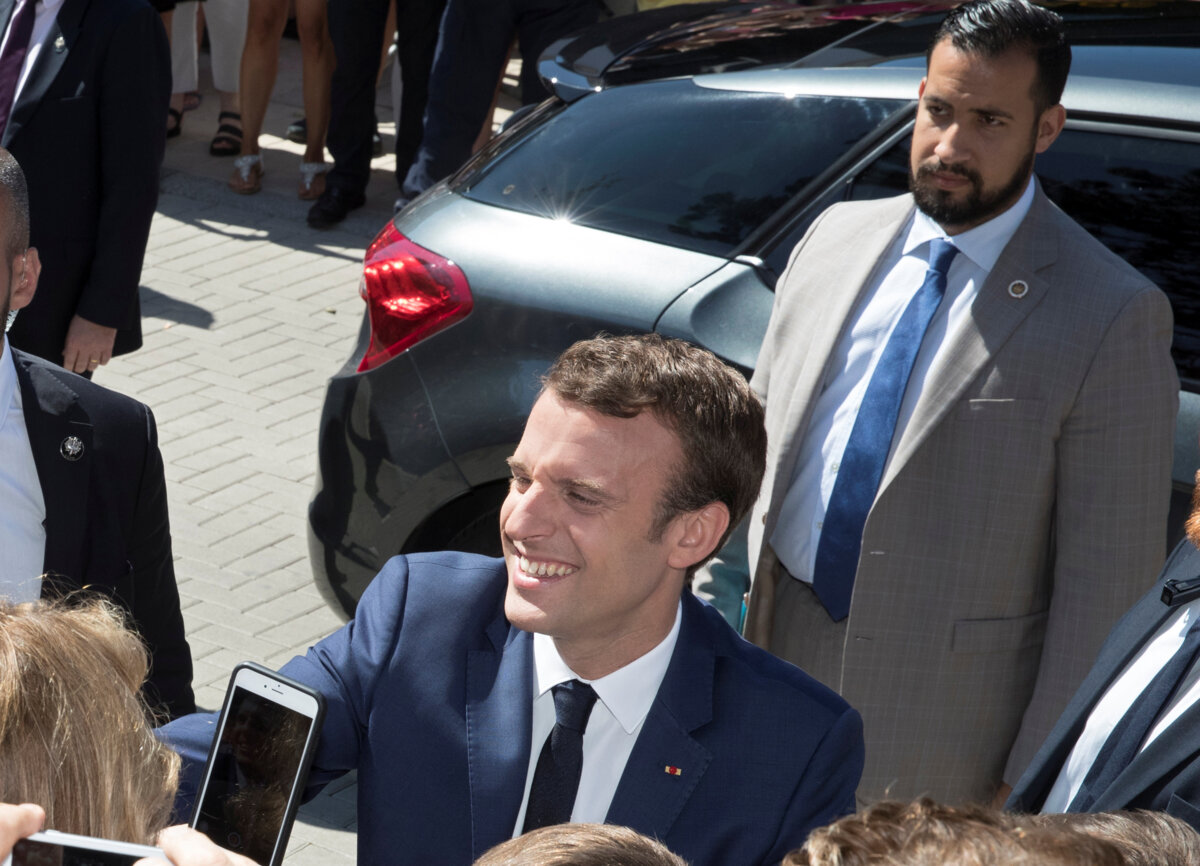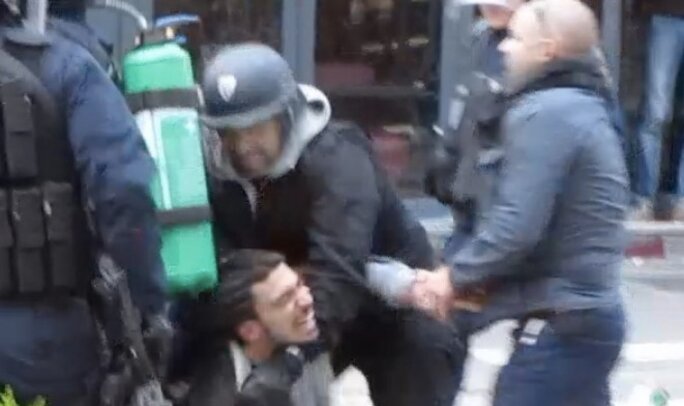Alexandre Benalla, President Emmanuel Macron’s disgraced former deputy cabinet chief and personal security aide, who is under formal investigation by magistrates for assaulting several people during May Day marches in Paris this spring, has been travelling outside of France in possession of a French diplomatic passport handed to him on May 28th, Mediapart has learnt.
Benalla used the diplomatic passport over recent weeks to travel to several African countries and Israel, according to security sources.
Benalla, 27, was dismissed from his job at the French presidency, the Élysée Palace, after media revelations in July of video footage of him, dressed with police insignia, assaulting individuals during May Day demonstrations in Paris.
He and an accomplice, Vincent Crase, a gendarmerie reservist and employee of President Macron’s LREM party, were officially present during the May 1st marches in Paris as “observers” of policing that day, but both were filmed violently manhandling individuals. In one incident Benalla was filmed stamping on a man. Both are now under formal investigation for the assaults and face a possible jail term if sent for trial.
Benalla’s diplomatic passport, which bears the reference number 17CD09254, was issued to him on May 24th this year – three weeks after the events of May 1st, which were immediately made known to his hierarchy at the Élysée – and is valid until September 19th 2022.

Enlargement : Illustration 1

On one page of the passport, as is custom with such documents, it is stated that: “We, the ministry of foreign affairs, request the civil and military authorities of the French republic and the authorities of friendly nations and allies to allow free passage to the holder of the present passport and to afford them aid and protection.”
Benalla, who since being sacked in July by the Élysée has set himself up as a “consultant” in business affairs, notably travelled to Chad earlier this month with what he said was a delegation of Middle-East businessmen, when he met with local high-ranking officials reportedly to discuss business contracts, just weeks before a visit to the north-central African state by President Macron.
The controversy prompted by the revelation of Benalla’s stay in the Chadian capital Ndjamena led the Élysée to issue a statement saying that President Macron, during his visit there last Saturday, had made clear to his Chadian counterpart that the former presidential aide was “in no manner either an unofficial or official intermediary”.
A diplomatic passport allows its holder to avoid usual checks on travellers, and to benefit from a protection guaranteed by the 1961 Vienna Convention on Diplomatic Relations. Under the international treaty, there also exists a lesser “service” passport, issued to staff on particular official missions, which allows the holder fewer protections.
The diplomatic passport used by Benalla is usually reserved for career diplomats and, beyond these, certain members of ministerial cabinets whose duties involve diplomatic affairs or particular missions on behalf of the State.

Enlargement : Illustration 2

It is unclear why or how Benalla was not required to hand back the passport after his dismissal from the Élysée in July. Before the first publication of this report, in French, on Thursday, neither the French presidential office nor the French foreign affairs ministry had replied to questions submitted to them by Mediapart.
Alexandre Benalla also failed to respond to Mediapart’s request for an interview.
It is also unclear why Benalla was even issued with a diplomatic passport in the framework of his duties at the Élysée. Benalla’s role as personal security aide to Macron placed him in the position of favoured bodyguard for the president and his wife Brigitte, during both official and private travel. But his official post as deputy to Macron’s presidential cabinet director gave him no official diplomatic responsibilities. Although, as the president’s personal security advisor, he might be required to travel abroad with Macron, this did not necessarily require diplomatic immunity.
“When you travel officially with the president, you don’t even need a diplomatic passport,” said a former member of French ministerial cabinets, speaking on condition his name was withheld. “There is just a check that you are on the list of the delegation and you escape checks on arrival.”
However, on September 19th, testifying under oath before a French Senate commission of inquiry into the violent events he was involved in on May 1st, Benalla told the panel of senators: “The delivery of diplomatic passports is automatic for all the personnel who might be called on to travel with the president.” Speaking more precisely about his own diplomatic passport, he added: “The passport renewal of May 24th 2018 is a standard administrative procedure. The documents in question have remained in the office I occupied at the Élysée.”
In a report published in August, French daily Le Parisien questioned how Benalla could have obtained a diplomatic passport on May 24th, (as reported by French weekly Valeurs actuelles), three weeks after he was officially suspended from duty over the May Day events (a disciplinary measure which preceded his later dismissal). “Neither the Élysée, nor the Ministry of Foreign Affairs agreed to comment,” reported Le Parisien, adding, “radio silence at the Château” – the nickname for the Élysée Palace. Until today, it was not known that Benalla had, despite the press interest, been able to keep the passport.
Since his forced departure from the Élysée, Benalla has made numerous trips abroad involving meetings with individuals implicated in ongoing anti-corruption investigations. These include Alexandre Djouhri, an intermediary of former president Nicolas Sarkozy, who he met in London (see more here) where Djouhri awaits extradition to France in connection with a judicial investigation into suspected Libyan funding of Sarkozy’s 2007 election campaign.
Benalla’s visit to Chad was first revealed by French newsletter specialised in African affairs, La Lettre du Continent , and further detailed by French daily Le Monde. Both reported a meeting between Benalla and Oumar Déby, the brother of French backed Chadian president Idriss Déby, who has ruled the north-central African nation for three decades. Oumar Déby is the head of Chad’s Directorate-General of Strategic Reserves (DGRS).
Benalla’s visit to Chad preceded a visit to the country, last weekend, by Emmanuel Macron, and the controversy led the Élysée to issue a statement on December 25th saying that Macron had raised the subject of his former scerfurity aide with his Chadian counterpart. “Emmanuel Macron insisted on making known to Idriss Déby on Saturday that this person [Benalla] was in no manner an unofficial or official intermediary,” read the statement, which also added that the French presidency had “no further contact of any sort” with Benalla.
In a letter revealed by Le Monde and dated December 22nd, Macron’s cabinet chief Patrick Strzoda wrote to Benalla demanding that he give “all pertinent information” about “eventual personal and private missions” that he may have “exercised or prepared as a consultant”.
“We could not fail to react to the existence of business relations in France or abroad with private interests, quite incompatible with your responsibilities […] and which you have never revealed,” continued Strzoda. “Regarding your current personal activities, we ask you to ensure that they are conducted in strict respect of the requirement upon you for confidentiality and the ethical obligations with regard to the exercise of your past responsibilities within the [presidential] cabinet. Obviously, we forbid you from claiming any recommendation or tacit support from the presidency.”
Meanwhile, following the December 25th statement from the Élysée, Benalla issued his own statement on Wednesday in which he said he refused to accept “comments made by certain people in the president’s entourage”, adding: “I went to Chad accompanied by a foreign economic delegation in the framework of investments.”
His trip to Chad was on behalf of Qatari and Turkish companies, and was overseen by French-Israeli businessman Philippe Hababou Solomon, who also declined to answer questions from Mediapart.
-------------------------
- The French version of this report can be found here.
English version by Graham Tearse
------------------------------------------------------------------------------
If you have information of public interest you would like to pass on to Mediapart for investigation you can contact us at this email address: enquete@mediapart.fr. If you wish to send us documents for our scrutiny via our highly secure platform please go to https://www.frenchleaks.fr/ which is presented in both English and French.
------------------------------------------------------------------------------


